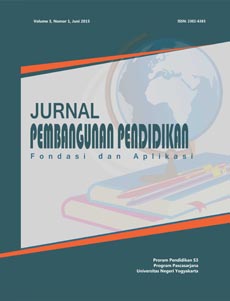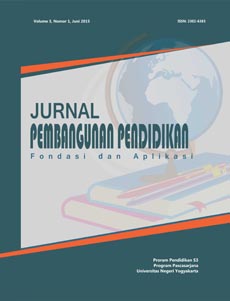EFL students’ perceptions of using the “Learn English with TV Series” YouTube channel as supplementary learning material
DOI:
https://doi.org/10.21831/jppfa.v12i2.73379Keywords:
EFL students, YouTube Channel, Perceptions, Supplementary learning MaterialAbstract
Digital platforms have increasingly become essential tools for enhancing English as a Foreign Language (EFL) learning, particularly in contexts where exposure to authentic language use is limited. YouTube, as one of the most widely used platforms, provides accessible, engaging, and authentic learning resources for EFL learners. Among the available channels, “Learn English with TV Series” has gained popularity due to its use of authentic scenes from popular TV shows to teach vocabulary, pronunciation, grammar, and communication strategies. This study aims to examine EFL students’ perceptions of using this YouTube channel as supplementary learning material. Employing a quantitative descriptive design, data were collected through an online survey administered to 100 EFL students from various regions in Indonesia. The findings indicate overwhelmingly positive perceptions: students frequently engage with the channel, find the content interesting and easy to understand, and perceive it as beneficial for developing listening, speaking, vocabulary, and grammar skills. The channel also enhances students’ motivation to practice English and is widely recommended among peers. These results demonstrate the channel’s potential as an effective supplementary resource to support formal English instruction. The study highlights the importance of integrating digital learning tools into EFL pedagogy and offers insights for educators and content creators in designing engaging and pedagogically sound online learning materials.
References
Alawadh, H. M., Alabrah, A., Meraj, T., & Rauf, H. T. (2023). English Language Learning via YouTube: An NLP-Based Analysis of Users' Comments. Computers, 12(2), 1–18. https://doi.org/10.3390/computers12020024
Albahlal, F., & Albahlal, F. S. (2019). The Impact of YouTube on Improving Secondary School Students' Speaking Skills: English Language Teachers' Perspectives. Journal of Applied Linguistics and Language Research, 6(2), 1–17. http://www.jallr.com/index.php/JALLR/article/view/971
Albiladi, W. S. (2019). Teaching English pronunciation revisited: The challenges of teaching EFL in non-English-speaking countries. European Journal of Foreign Language Teaching, 4(2), 41–50. https://doi.org/10.5281/zenodo.3566658
Alharbi, S. H. (2021). The Struggling English Language Learners: Case Studies of English Language Learning Difficulties in EFL Context. English Language Teaching, 14(11), 108. https://doi.org/10.5539/elt.v14n11p108
Anggraini, M. P., Anugerahwati, M., Sari, R. N., Miranty, D., Kurniasih, & Iswahyuni. (2022). The ICT Use of Informal Digital Learning in Enhancing EFL University Students' English Performance. Call-Ej, 23(3), 94–114.
Brame, C. J. (2016). Effective educational videos: Principles and guidelines for maximizing student learning from video content. CBE Life Sciences Education, 15(4), es6.1-es6.6. https://doi.org/10.1187/cbe.16-03-0125
Brook;Jennifer. (2011). The Affordances of YouTube for Language Learning and Teaching Jennifer Brook What is YouTube ? Hawaii Pacific University TESOL Working Paper Series, 9(1,2), 37–56.
Hibatullah, O. F. (2019). The Challenges of International EFL Students to Learn English in a Non-English Speaking Country. Journal of Foreign Languange Teaching and Learning, 4(2). https://doi.org/10.18196/ftl.4240
Ä°lter, B. G. (2015). How does Technology Affect Language Learning Process at an Early Age? Procedia - Social and Behavioral Sciences, 199, 311–316. https://doi.org/10.1016/j.sbspro.2015.07.552
Kohler, S., & Dietrich, T. C. (2021). Potentials and limitations of educational videos on YouTube for science communication. Frontiers in Communication, 6(May), 1–10. https://doi.org/10.3389/fcomm.2021.581302
Nofrika, I. (2019). EFL Students' Voices: The Role of YouTube in Developing English Competences. Journal of Foreign Languange Teaching and Learning, 4(1). https://doi.org/10.18196/ftl.4138
Saed, H. A., Haider, A. S., Al-Salman, S., & Hussein, R. F. (2021). The use of YouTube in developing the speaking skills of Jordanian EFL university students. Heliyon, 7(7), e07543. https://doi.org/10.1016/j.heliyon.2021.e07543
Sakkir, G., Dollah, S., & Ahmad, J. (2020). Students' Perceptions toward Using YouTube in EFL Classrooms. Journal of Applied Science, Engineering, Technology, and Education, 2(1), 1–10. https://doi.org/10.35877/454ri.asci2125
Shadiev, R., & Wang, X. (2022). A Review of Research on Technology-Supported Language Learning and 21st Century Skills. Frontiers in Psychology, 13(July), 1–19. https://doi.org/10.3389/fpsyg.2022.897689
Tahmina, T. (2023). Students' Perception of the Use of Youtube in English Language Learning. Journal of Languages and Language Teaching, 11(1), 151. https://doi.org/10.33394/jollt.v11i1.6883
Taufiq, W., & Megawati, F. (2023). Technology for English Language Learners (T. Multazam & M. D. K. Wardana (eds.); 1st ed.). UMSIDA Press.
Toleuzhan, A., Sarzhanova, G., Romanenko, S., Uteubayeva, E., & Karbozova, G. (2023). The Educational Use of YouTube Videos in Communication Fluency Development in English: Digital Learning and Oral Skills in Secondary Education. International Journal of Education in Mathematics, Science and Technology, 11(1), 198–221. https://doi.org/10.46328/ijemst.2983
Wang, H. chun, & Chen, C. W. yu. (2020). Learning English from YouTubers: English L2 learners' self-regulated language learning on YouTube. Innovation in Language Learning and Teaching, 14(4), 333–346. https://doi.org/10.1080/17501229.2019.1607356
Widiantari, I. A. P. A., Sulistia, D. N. L. P. E., & Artini, L. P. (2023). YouTube as an Alternative Learning Media for Independent Bilingual Young Learners : A Review. JET: Journal of English Teaching, 9(1), 83–97.
Wu, Y. L. (2014). The impact of technology on language learning. Lecture Notes in Electrical Engineering, 309 LNEE, 727–731. https://doi.org/10.1007/978-3-642-55038-6_112
Zhang, Y. (2022). The Effect of on Educational Technology on EFL Learners' Self-Efficacy. Frontiers in Psychology, 13(April), 1–8. https://doi.org/10.3389/fpsyg.2022.881301
Published
How to Cite
Issue
Section
Citation Check
License
Copyright (c) 2025 Jurnal Pembangunan Pendidikan: Fondasi dan Aplikasi

This work is licensed under a Creative Commons Attribution-ShareAlike 4.0 International License.
The Authors submitting a manuscript do so on the understanding that if accepted for publication, copyright publishing of the article shall be assigned to Jurnal Pembangunan Pendidikan: Fondasi dan Aplikasi
 | Jurnal Pembangunan Pendidikan: Fondasi dan Aplikasi by https://journal.uny.ac.id/index.php/jppfa is licensed under a Creative Commons Attribution-ShareAlike 4.0 International License. |













